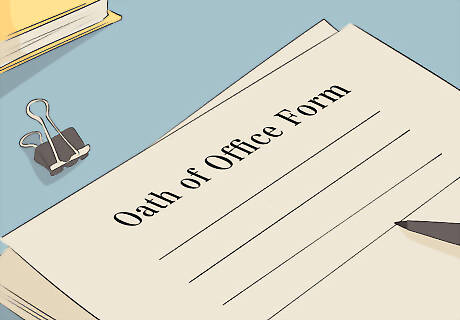
views
- Complete an approved notary training course and pass a written notary exam before filling out your application if your state requires it.
- Collect your commission certificate and register your signature to begin your work as a mobile notary.
- Look for notary companies and law firms that may be hiring, or write a business plan and begin networking to start your own independent mobile notary service.
Applying to Become a Notary

Check your state’s basic eligibility requirements. The requirements to apply to be a notary vary by state. However, most states require you to be at least 18 years of age, a citizen or permanent legal resident of the United States, and able to read and write in English. Most states also require that you be a resident within that state, though there usually aren’t any specific requirements about how long you’ve been living in that state. To find your state’s specific requirements, search “become a notary” followed by the name of your state on the internet. You’ll usually be able to find the information on your state’s Department of State site or the specific website for your city or county.

Complete a notary training course. Some states, such as Florida and Pennsylvania, will require you to complete a certain amount of hours of notary education and training. Some states will require you to complete your education within a certain number of months before you submit your application. For example, the state of Pennsylvania requires applicants to complete 3 hours of approved notary education within 6 months before submitting their application. Some approved notary education programs include those from Empowered Notary and American Society of Notaries. Once you’ve completed your education, you’ll likely need to submit some form of proof to your Department or State or wherever you’re submitting your application. Make sure you get an official certificate of completion or some other official document from the course you take.

Fill out and submit a notary application. Depending on your state, you might be able to fill out your application online, or you’ll have to fill out a paper copy and mail it in or drop it off at a specific location. Many states also require you to pay a fee that can range from below $50 to over $100. Some states, such as Illinois, will also require you to submit a copy of your driver’s license or a valid state ID in order to prove your identity. You might also need to have your application notarized by someone else who works as a notary. In some states, such as Florida, you’ll work through a bonding agency after completing your education. After making a payment to the agency, they’ll take care of getting your application to you, paying your fees, and providing your notary bond and seal.

Submit an oath of office form or jurat. Along with your application, your state may require you to fill out a form stating that all of the information you’ve provided is true, complete, and correct. The oath might also ask you to confirm that you will perform your duties as a notary to the best of your abilities and act in good faith. When you fill out this form, write your name as you’d like for it to appear on your commission. This oath might also have to be notarized by another notary. The oath of office is also called a jurat in some states.

Pass the written exam. Some states will also require you to pass a written examination to demonstrate that you understand the requirements and practices specific to your state. Your state will usually have a Notary Handbook for you to study before taking the exam. You may also have to pay a fee to sit the exam. It’s okay if you don’t pass the exam on your first try since many states will allow you to retake it, though you might have to pay another fee.

Complete a background check. In some cases, you’ll be required to undergo a background check before you can receive your commission. Your state might provide this background check for you, or you might have to request for a local law enforcement entity (police, sheriff, etc.) to conduct a formal background check. In California, you’ll be required to get fingerprinted as part of your background check and disclose any convictions or arrests. If you have a felony, you may have the opportunity to appeal your case if a recommendation is made to deny your application.

Receive your commission certificate in person or by mail. Once your application has been accepted, you’ll be almost ready to start your new journey as a mobile notary. Your notary commission is written confirmation that you’re legally allowed to perform notary duties. Depending on where you live, you’ll either receive your commission in the mail, or you might have to go somewhere like a courthouse or a local government building to pick it up. If you submitted an online application, you might be able to track the progress of your application and get a better estimate of when you should be expecting your certificate. Be sure to keep your commission certificate in a secure place. You may not be able to receive an additional copy if you lose it. Notary commissions are generally valid for 4 years.

Purchase a surety bond. Before you can go out and start fulfilling your duties as a mobile notary, a majority of states will require you to first take out a surety bond of a certain amount. Many states require you to purchase such a bond in order to protect future clients should you fail to fulfill your duties as a notary. The amount a state requires for your bond can range anywhere from $5,000 to $10,000. You will typically purchase a bond from a bond agency. Paying for bonds is similar to how you might pay for insurance, usually by paying monthly premiums.

Register your signature. As a notary, your signature is one of your most important assets. Depending on where you’ll be offering your services, you may need to register your signature with a specific department before you can begin acting as a notary. Be sure to register your signature exactly as it appears on your commission. Where you register your signature will vary by state. For example, if you live in Pennsylvania, you’ll register your signature in person in the office of the Recorder of Deeds.
Working as a Mobile Notary

Look for open mobile notary positions. There are many companies out there that will hire you as a mobile notary and send you out to help clients. Use sites like Indeed and LinkedIn to search for local companies and businesses that are looking to hire mobile notaries. Places like law firms, title and escrow companies, and already-established mobile notary recruitment businesses may benefit greatly from your skills.

Consider getting errors & omissions insurance. While surety bonds are meant to protect your clients, errors and omissions insurance (E&O insurance) is there to protect you. In the case that you accidentally make an error or omit an important detail while notarizing something, buying E&O insurance will help you cover legal costs. Lots of businesses and other professionals tend to buy this type of insurance.

Make sure you have a reliable form of transportation. One thing that sets mobile notaries apart from notaries public is the fact that they travel to their clients to perform their duties. So, it’s important that you have a reliable mode of transportation. Keep in mind that the farther you’re willing to travel (within your state, of course), the more clients you’ll likely be able to serve. In that case, it might be good to own a car instead of relying on local public transportation.

Purchase your notary seal. Your notary stamp is your personal seal of approval you’ll be using all throughout your time as a notary. Check your state’s official Notary Handbook to learn what your stamp is required to look like. Some might allow a simple self-inking stamp while others might require you to buy an embossed seal. The color ink you use might also be different by state. Order your personalized notary stamp online or at a local notary supply store. In some states, such as Massachusetts, you may be able to order a stamp from the Secretary of State’s office, though it’s highly recommended that you use an outside vendor or go to your local office supply store.

Keep a notary journal. In many states, it’s required that you keep records of all of your notarizations in a notary journal. In most cases, your journal must be a bound book with numbered pages. You can keep an electronic record of your notarizations as well, but many states will require you to have a physical journal by law. In each entry, include the date of the act, a description of the document or type of act you performed, the full name, signature, and address of your client, and the type of evidence they provided to prove their identity to you. Also, include a column to record how much you charged for your service. Other supplies you may need include a home printer and printer paper to scan and copy documents, a briefcase to transport all of your important paperwork, and personal business cards to give to your clients.
Starting Your Own Notary Business

Research the competition in your state or area. If you plan to turn your job as a mobile notary into a fully grown business or side hustle, do some research into the mobile notary industry and see what other businesses are doing. Look at what services they provide, what they usually charge for their services, and what their clients are saying about them in their reviews. Look at other notaries’ personal websites and social media sites to see how they brand themselves and offer their services.

Create a business plan. Writing up a formal business plan can take some time, but it’ll ultimately help you create a strong and detailed blueprint to follow as you start to get your business off the ground. The important points to cover in your plan include: Executive summary: A description of what services your business will provide and your mission statement Company description: What sets your business apart from others, who you plan to serve, and what problems you intend to solve Market analysis: A detailed description of what similar businesses are doing and what their strengths are Organization and management: A description of who will be leading your business and how duties will be delegated Service or product line: An explanation of what service you’re providing and how it will benefit your customers Marketing and sales: A rough game plan for how you’re going to advertise your business and attract and retain clients

Determine how much you’ll charge for your services. The amount you charge in fees for your services will usually be somewhat controlled by your state government. In some states, there may be caps placed on the maximum amount you can charge for certain services. However, many states don’t regulate travel fees, so you’ll likely be able to set the rates for this fee yourself. You also have the option not to charge for certain services if you wish. Mobile notaries can make $75 to $200 per appointment depending on their experience and fees. Five appointments throughout the week could earn you $375 to $1,000. As an example, California has these maximum fees for different notary services: Acknowledgement (a form signed by someone to declare to a notary that they’ve willingly signed a document): $15 for each signature Jurat (a form that has a person swear to the truthfulness of a document): $15 for each signature Deposition (a witness’ sworn testimony taken out of court): $30 for each deposition Certifying a copy of a power of attorney or will (where the notary makes sure that the content of the document is copied correctly): $15 for each copy Public request for line item (disclosing specific lines from your notary journal): $0.30 per line item Travel fees (the rate you charge to travel to your client): Not regulated

Register your business and business name. Registering your business will likely be a simple process. In most cases, you’ll just have to register your business name with your local and state governments at the Secretary of State’s office, a business bureau, or a business agency. However, you may not need to register your business at all if you’re simply conducting business as yourself under your legal name. You also have the option to register your business with the federal government and receive a federal tax ID. This is good if you want trademark protection or a possible tax exempt status.

Create a website for your business. In the age of the internet, creating a website for your business is an extremely important part of pulling in potential clients. When you come up with the name for your business, do a quick search to see if the same domain name is available. If your business name and domain name are the same, it’ll be a lot easier for customers to find you. Your website can be as simple or detailed as you see fit. At a minimum, include a brief description of your business and the services you provide, an email address and phone number to contact, and the address of your physical office if you have one. It might also help to include positive reviews from past clients if you have any. Even if it’s just one or two people, a good word can go a long way in getting more people to seek out your services.

Join social media platforms and notary forums. You can reach a lot of people in just a couple of seconds by using social media. Create official accounts on sites like Facebook, Twitter, and Instagram to increase your reach. Post pictures, ad campaigns, or updates and news about your business on these sites. Making short YouTube videos is also a great way to promote your work and give more detailed explanations to curious viewers. Finally, do an internet search to find notary forums where you can talk to other mobile notaries and potential clients. For example notarycafe.com is a forum where notaries can share their experiences and advice with others.

Talk to friends and family to start networking. Networking can sound like a bit of a scary prospect, but just remember that talking to the people close to you also counts as networking. Reach out to your family members or friends and let them know about your new side hustle (or full-time job if you decide to go that route). Tell them to spread the word to their own friends and families, and soon you might find yourself with your first few clients. Continue making an effort to reach out to other people once you’ve built up your confidence. Another option is to find a mentor who has done well in the mobile notary business and get tips from them.

Offer additional services. If you want to get more clients and expand the reach of your business, read up on other services you can provide as a commissioned notary. For example, some states may allow you to work as an immigration forms specialist, or you may have to receive more training and another form of authorization to do so. Another option is to offer apostille services on behalf of your clients. This includes delivering important notarized documents that require apostilles to the correct agency and doing research into what forms are needed. You might also consider becoming a Notary Signing Agent (NSA), a special type of notary that specifically deals with home loan documents. NSAs need to complete a background check and pass a written exam each year to remain certified.



















Comments
0 comment